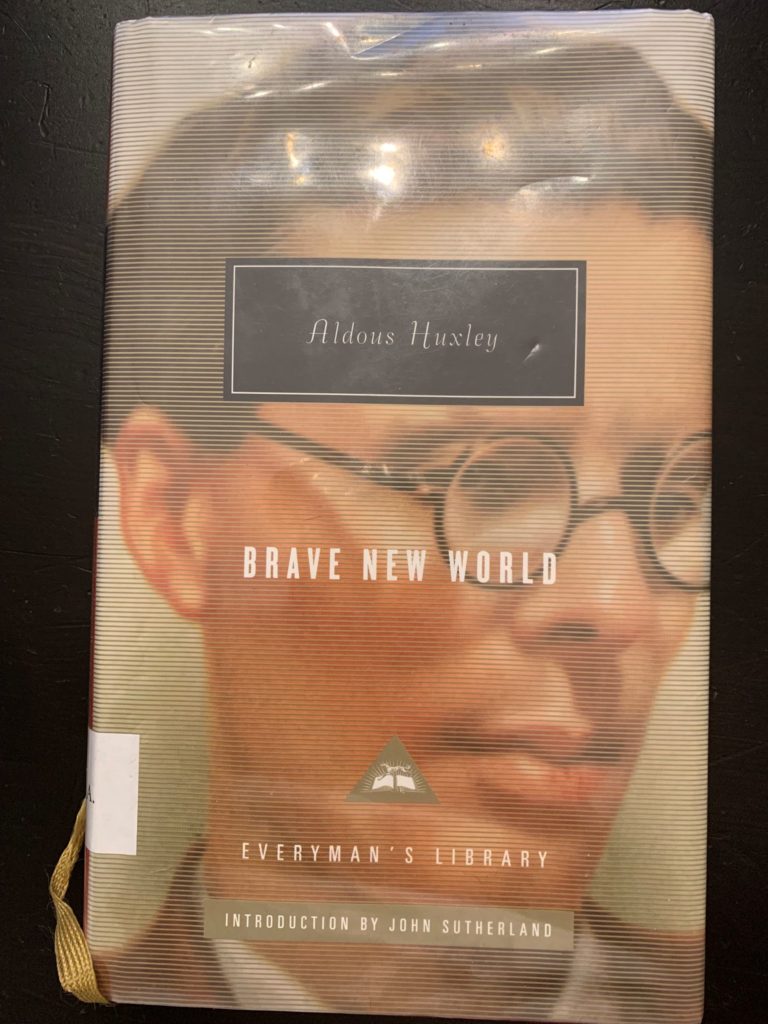I eluded to this but I almost gave up on this book. It really wasn’t until chapter 17 that things started to make any sense. That was page 184 out of 220. The interesting thing to this book was that Huxley wrote a forward to the 1946 edition of the book. He unlike Orwell lived to see his work actually have some longevity and gain traction in the world.
I found it interesting that Huxley’s greatest regret was that he was unable to anticipate the coming of nuclear energy in 1932. Therefore, his science fiction was ‘dated’. For the twenty-first century reader, I think it is pretty forgivable considering all of the other technological changes we have seen since 1946. To his credit, he also admitted that if he were to redo it, he would have rewritten a lot of it (without getting to in depth to precisely what he would change).
From Huxley’s own words, this was intended to imagine a society five hundred years in the future. Also, by observation the trend toward comfort over freedom was beginning. I am not totally sure of his influences but I do think it was a stroke of genius to imagine totalitarianism as a gentle blanket, a much more likely scenario than the failures of the iron curtain or China. Only North Korea seems to embrace the iron fist type totalitarian regime and even then I think it only kind of works because of it’s small size and population.
As I said at the beginning, the influences to the book were supposed to be 1) the industrial revolution, figure headed by Henry Ford 2) Jazz and 3) Frued. I could certainly see many references to Ford. In fact, there is a quote late in the book ‘…Industrial civilization is only possible when there is no self denial. Self-indulgence up to the very limits imposed by hygiene and economics. Otherwise the wheels stop turning.’ Everyone has a job and a place. People need to keep consuming so that everyone keeps working. Everyone needs to keep working so that they don’t have idle time.
Jazz is a curious one, maybe it was situational like the instrument named the sexophone (sounds like saxophone, it was never defined). There were many places where lyrics came from the characters mouths in song or rhythm. I am far enough removed from Jazz that those lyrics may have been adaptations of popular songs, not quite sure. Certainly music was part of the conditioning in civilization. Like all entertainment, if it can be subverted to push a useful message, there is no doubt that can be leveraged for propaganda.
That leads us to Freud. I think that you will all remember my analysis to Freud and 1984. To me, that was clear and and easier link to make. In this case, I have a harder time making the outright connection. I think you could easily overlay Id, Ego and Super Ego to characters events and circumstances. But I didn’t get the sense that the story was laid out to prove the theory. Rather, it seems like Huxley was aware of the theory and said “that makes sense, that is how humans behave” and then wrote the story. I think those looking to make Brave New World justify Freud would have an easier time than saying Freud’s influence drove the text.
Knowing the Orwell was a student of Huxley makes a lot of sense. It does seem fairly evident that Brave New World was highly influential in 1984. I am sure that they shared some fairly poignant discussion and had similar thoughts. In some ways I am glad I didn’t know that they had a connection before I read and analyzed 1984. It was easier for me to be objective and follow my instincts.
I think there are aspects of both that could be combined together. For instance, I don’t know about ‘hatching’ civilization but I do think the kinder, gentler totalitarianism is the more likely play than Big Brother. Society seemed more realistic in 1984 as well as the propaganda techniques but conditioning and chemical control also seems possible.
I learned something during this process. I don’t do well analyzing something until I have seen the whole picture, that is read the whole book. I was struggling to even identify the concepts until I was done and then they seemed so clear and words began to flow. I even cut out things that were more minor because I had so much to say about what I considered major concepts.
End Your Programming Routine: If it wasn’t for chapters 16-18 being so outstanding, this book would have been a hard no from me. If you are choosing between 1984 and Brave New World, I recommend 1984 any day and every day. Not only does it seem more plausible, the storyline is generally more interesting. Brave New World takes too many unnecessary detours for character development that simply don’t matter and don’t impact the story. That being said, this is a good companion to 1984 and I would read them in that order. As always, additional knowledge and perspective are helpful when preparing for the quiet revolution.


Recent Comments